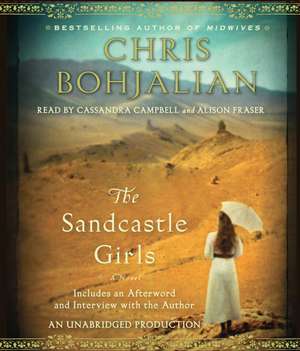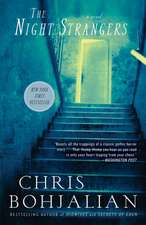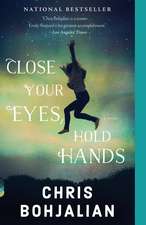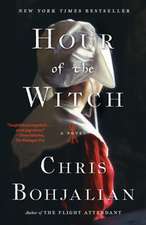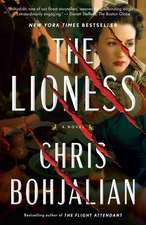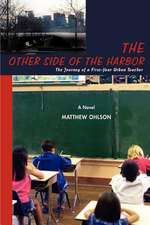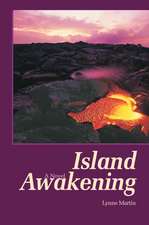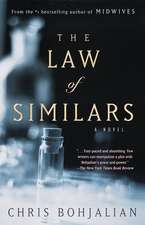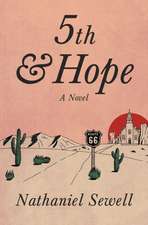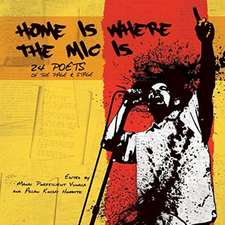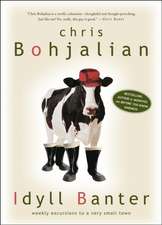The Sandcastle Girls
Autor Chris Bohjalian Cassandra Campbell, Alison Fraseren Limba Engleză CD-Audio – 30 iun 2012
In his fifteenth book, The Sandcastle Girls, he brings us on a very different kind of journey. This spellbinding tale travels between Aleppo, Syria, in 1915 and Bronxville, New York, in 2012—a sweeping historical love story steeped in the author’s Armenian heritage, making it his most personal novel to date.
When Elizabeth Endicott arrives in Syria, she has a diploma from Mount Holyoke College, a crash course in nursing, and only the most basic grasp of the Armenian language. The First World War is spreading across Europe, and she has volunteered on behalf of the Boston-based Friends of Armenia to deliver food and medical aid to refugees of the Armenian genocide. There, Elizabeth becomes friendly with Armen, a young Armenian engineer who has already lost his wife and infant daughter. When Armen leaves Aleppo to join the British Army in Egypt, he begins to write Elizabeth letters, and comes to realize that he has fallen in love with the wealthy, young American woman who is so different from the wife he lost.Flash forward to the present, where we meet Laura Petrosian, a novelist living in suburban New York. Although her grandparents’ ornate Pelham home was affectionately nicknamed the “Ottoman Annex,” Laura has never really given her Armenian heritage much thought. But when an old friend calls, claiming to have seen a newspaper photo of Laura’s grandmother promoting an exhibit at a Boston museum, Laura embarks on a journey back through her family’s history that reveals love, loss—and a wrenching secret that has been buried for generations.
Preț: 204.42 lei
Nou
Puncte Express: 307
Preț estimativ în valută:
39.13€ • 42.52$ • 32.89£
39.13€ • 42.52$ • 32.89£
Indisponibil temporar
Doresc să fiu notificat când acest titlu va fi disponibil:
Se trimite...
Preluare comenzi: 021 569.72.76
Specificații
ISBN-13: 9780307917379
ISBN-10: 0307917371
Dimensiuni: 130 x 188 x 29 mm
Greutate: 0.26 kg
Ediția:Completă
Editura: Random House Audio Publishing Group
ISBN-10: 0307917371
Dimensiuni: 130 x 188 x 29 mm
Greutate: 0.26 kg
Ediția:Completă
Editura: Random House Audio Publishing Group
Notă biografică
Chris Bohjalian is the critically acclaimed author of fifteen books, including the New York Times bestsellers The Double Bind, The Night Strangers, and Skeletons at the Feast. His novel Midwives was a number one New York Times bestseller and a selection of Oprah’s Book Club. His work has been translated into more than twenty-five languages, and three of his novels have become movies (Secrets of Eden, Midwives, and Past the Bleachers). He lives in Vermont with his wife and daughter.
Extras
Chapter 1
The young woman, twenty-one, walks gingerly down the dusty street between her father and the American consul here in Aleppo, an energetic fellow almost her father’s age named Ryan Donald Martin, and draws the scarf over her hair and her cheeks. The men are detouring around the square near the base of the citadel because they don’t yet want her to see the deportees who arrived here last night--there will be time for that soon enough--but she fears she is going to be sick anyway. The smell of rotting flesh, excrement, and the July heat are conspiring to churn her stomach far worse than even the trip across the Atlantic had weeks earlier. She feels clammy and weak-kneed and reaches out for her father’s elbow to steady herself. Her father, in turn, gently taps her fingers with his hand, his vague and abstracted attempt at a comforting gesture.
“Miss Endicott, do you need to rest? You look a little peaked,” the consul says, and she glances at him. His brown eyes are wide and a little crazed, and already there are thin rivulets of sweat running down both sides of his face. He is wearing a beige linen jacket, which she imagines to be infinitely more comfortable than her father’s gray woolen suit. She brings her free hand to her own face and feels the moisture there. She nods in response to his question; she does need to sit, though it embarrasses her to admit this. Still, it may be a nonissue. She can’t see where she might on this squalid street. But Ryan quickly takes her arm and guides her from her father, leading her to a stoop on the shady side of the thin road. He wipes off the squat step with his bare hand. There is a ramshackle wooden door behind the stoop, shut tight against the midmorning heat, but she presumes that whoever lives there won’t mind if she sits. And so there she rests and breathes in deeply and slowly through her mouth, watching the women in their headscarves and long, loose robes--some hide all but their eyes behind burqas--and the men in their ornate blazers, their voluminous, shapeless trousers, and their flowerpot-like fez hats. Some of the men glance at her sympathetically as they pass, others with a brazen want in their eyes. She has been warned.
“There’s a nice breeze today,” Ryan says cheerfully, and while she appreciates the slightly cooler air, wafting along with it is the stench from the square. “Before you arrived, the heat was just unbearable.”
She can’t imagine it being hotter. At the moment, she can’t imagine anywhere being hotter. And yet she found their apartment last night unexpectedly comfortable after the endless weeks aboard a ship, then a horse-drawn carriage, and finally two train cars that boasted only wooden seats. It was warm, but she had stood at her window for nearly half an hour in the middle of the night, gazing out at the row of statuesque cypress on the hill beyond the American compound and the bower of trees just inside the walls. She saw more stars than she ever saw in Boston, and the half moon seemed to dangle eerily, beautifully close to the earth.
Her father is surveying the rows of sand-colored two-story buildings that curl toward an alley, his arms folded across his chest, his face stern, and then she notes him arch his back suddenly and stand up a little straighter. Ryan sees what he sees and murmurs just loud enough for her to hear, “Oh, Jesus, no. Not more.” Both Ryan and her father glance down at her, but they realize there is absolutely nothing they can do; there is not a way in the world to shield her from what is coming. Besides, this is why she is here, isn’t it? Didn’t she volunteer to be a part of this aid mission? To chronicle what she sees for their organization, the Friends of Armenia, and to volunteer at the hospital--to do, in essence, whatever she could to help? Still, discomfort leaches from both men like perspiration, and she finds it interesting that they are as embarrassed as they are disgusted. If they had been here alone--if she had remained back at the American compound--her father and the American consul now would be experiencing only rage. And so she presses the palm of her hand against the wall of the house, the stone unexpectedly cool, and rises.
Approaching from down the street is a staggering column of old women, and she is surprised to observe they are African. She stares, transfixed. She thinks of the paintings and drawings she has seen of American slave markets in the South from the 1840s and 1850s, though weren’t those women and men always clothed--if only in rags? These women are completely naked, bare from their feet to the long drapes of matted black hair. And it is the hair, long and straight though filthy and impossibly tangled, that causes her to understand that these women are white--at least they were once--and they are, in fact, not old at all. Many might be her age or even a little younger. All are beyond modesty, beyond caring. Their skin has been seared black by the sun or stained by the soil in which they have slept or, in some cases, by great yawning scabs and wounds that are open and festering and, even at this distance, malodorous. The women look like dying wild animals as they lurch forward, some holding on to the walls of the stone houses to remain erect. She has never in her life seen people so thin and wonders how in the name of God their bony legs can support them. Their breasts are lost to their ribs. The bones of their hips protrude like baskets.
“Elizabeth, you don’t need to watch,” her father is saying, but she does. She does.
Herding the women forward through the town are half a dozen young men, two on horseback who look nearly as weak as the women, and four walking beside the group. All of them have rifles slung over their shoulders. They, too, don’t look any older than Elizabeth, and it crosses her mind that the pair nearest her can’t be more than fifteen or sixteen; their moustaches are wisps, a boy’s attempt to look like a man.
Just before the group reaches them, the gendarmes guide the women down the narrow street that will lead eventually to the square beneath the citadel, where they will be deposited with the deportees who arrived here yesterday. The men are short-tempered and tired. They strike the women when they move slowly or clumsily. They yank them back to their feet by their hair when they collapse. Elizabeth tries to count the women as they turn to the right and disappear into the alley, but reflexively she looks away whenever one of the skeletons meets her eye. Still, she guesses there are at least 125 of them. She verbalizes the number aloud without thinking.
“I assure you, Miss Endicott,” says Ryan, “when that group left Zeitun or Adana or wherever, there were at least a thousand of them.”
“Why did the Turks take their clothes?” she asks him.
He shakes his head. “They don’t usually--unless they’re planning to kill them. Sometimes they take the men’s clothes immediately before executing them; they worry the clothes of the dead are defiled. But I have no idea why they did in this case. Degrade the survivors, maybe. Perhaps increase the chances they’ll die on their own in the sun. But don’t look for reason in any of this.”
“And where are the men?”
He dabs at his forehead with a handkerchief. “It’s safe to assume they’re dead. Either they were--” He doesn’t finish because her father glares at the consul to be silent. To be still. Her father is hoping to introduce her to this world gradually. In increments. They discussed it little on either the ship or the train. Generalities of Ottoman history only.
Later this month, the two doctors in their party will arrive and they will start work. They--along with a returning missionary named Alicia Wells--telegrammed that their ship was going to be delayed leaving Boston, and might then take a more roundabout course to avoid U‑boats. But whether the physicians are delayed two weeks or three might make all the difference in the world for some of the survivors who are brought here. These women, she presumes, will be long gone by then, marched back into the desert to one of the resettlement camps to the southeast. So will the group that is already in the square, the women and children who staggered in from the desert yesterday.
In the meantime, Elizabeth can’t imagine what in the name of God she--what anyone--can do for them. Still, after catching her breath, she and her father and the American consul decide that instead of spending lunch discussing the conditions in Aleppo and planning for the arrival of the rest of their group, they will follow these woeful deportees down the alley and into the square, and there see what they can do to help.
Ryan Martin leaves to find rags for the women to wear, but by the time he returns with a wagon of tattered dresses and blouses--remnants from the dead who have passed through Aleppo that summer--the newly arrived deportees already have been clothed by the other refugees. In the meantime, Elizabeth and a nurse from the hospital pick at the vermin on the women and clean the gaping wounds on their legs and ankles and feet. They ration the little calamine lotion and olive oil they have for those women whose sunburns have not seared deep into their flesh, and gently wash the wounds of those whose skin--especially on their shoulders and backs--has peeled off like a snake’s. Within minutes they finish off the one large bottle of iodine the nurse has brought. Elizabeth gives the deportees water and bowls of thin bulgur soup to eat, because it is all they can scare up at the moment. There may be bread tomorrow. She feels helpless. When she was given her nursing training back in Boston, no one prepared her for dysentery. For gangrene. For feet with bones splintered from weeks of walking barefoot, the toes and heels swollen and mangled and deformed.
Most of the women are clustered underneath makeshift tents--canvas pulled tight on tottering wooden poles--but there are more women than there is room, so they spread out beyond the tent when the sun is no longer overhead and there are long stripes of comforting black shade. The children--among whom the only males in this new group can be found--remind her of dead sea horses she once saw on the beach at Cape Cod: The children, like the sea horses, are curled up on their sides and their bones seem as brittle and sharp as the shells of the dried pipefish. Perhaps a quarter mile away is a hospital, primitive by Boston standards, but a hospital nonetheless. It infuriates Elizabeth that there is, apparently, no room for these women there, and so far not a single doctor has emerged from the building and offered to help. Ryan has tried to mollify her by telling her that the vast majority of the beds there are filled with Armenian women and children, but this reality too has left her seething inside.
The number of deportees who speak either English or French surprises Elizabeth, though most are too tired right now to talk. Nevertheless, there is a woman who looks to be in her fifties but Elizabeth suspects is actually half that age, who murmurs “thank you” in English as she takes the bowl of soup and brings it to her lips.
“You’re welcome,” Elizabeth says. “I wish it were a more substantial meal.”
The woman shrugs. “You’re American,” she observes, a statement. She is wearing a man’s shirt and a skirt that balloons around her like a sack.
“Yes. My name is Elizabeth.”
“I’m Nevart,” the Armenian offers, and Elizabeth carefully rolls the name around in her mind. A small girl sleeps beside the woman, the child’s collarbone rising and falling ever so slightly with each breath. Elizabeth guesses that she is seven or eight. “Where in America?” Nevart asks.
“Boston,” Elizabeth answers. “It’s in the state of Massachusetts.” The woman’s nails are as brown as her skin. “Sip that soup slowly,” she adds.
Nevart nods and places the bowl in her lap. “I know where Boston is,” she says. “I heard you speaking Armenian a minute ago. How much do you know?”
“A little. Very little, actually. I know mostly vocabulary. I know words, not grammar.” Then Elizabeth asks the woman, “How did you learn English?”
“My husband went to college in London. He was a doctor.”
Elizabeth thinks about this, imagining this wraith of a woman living in England. As if Nevart can read her mind, the deportee continues, “I wasn’t with him most of the time. I have been to London, but only for a visit.” She sighs and looks into Elizabeth’s eyes. “I’m not going to die,” she murmurs, and she almost sounds disappointed.
“No, of course, you won’t. I know that.” Elizabeth hopes she sounds reassuring. She honestly isn’t sure whether this woman will live.
“You’re just saying that. But I know it because I was a doctor’s wife. I have survived dysentery. Starvation. Dehydration. They . . . never mind what they did to me. I am still alive.”
“Is that your little girl?” Elizabeth asks.
The woman shakes her head. “No,” she answers, gently massaging the child’s neck. “This is Hatoun. Like me, she is unkillable.”
Elizabeth wants to ask about the woman’s husband, but she doesn’t dare. The man is almost certainly dead. Likewise, she wonders if Nevart has lost her children as well, but again she knows no good can come from this inquiry. Wouldn’t the Armenian have said something about her own children if they were with her now--if they were alive?
Over the woman’s shoulder Elizabeth spies her father in the distance. He is ladling out the soup from a black cauldron and handing it to the women strong enough to stand and bring it to those who are collapsed under the tent. His sideburns and his beard, so much thicker and grayer than the thin whorls of cinnamon atop his scalp, look almost white in this light. They are expecting flour and sugar and tea in the next day or so--the first of two shipments they have arranged this month--though Ryan has warned her father and her that it is likely only a small fraction of what they have acquired will actually arrive in Aleppo.
“Where do we go next?” Nevart asks her. “They brought us here, but they won’t let us stay.”
The young woman, twenty-one, walks gingerly down the dusty street between her father and the American consul here in Aleppo, an energetic fellow almost her father’s age named Ryan Donald Martin, and draws the scarf over her hair and her cheeks. The men are detouring around the square near the base of the citadel because they don’t yet want her to see the deportees who arrived here last night--there will be time for that soon enough--but she fears she is going to be sick anyway. The smell of rotting flesh, excrement, and the July heat are conspiring to churn her stomach far worse than even the trip across the Atlantic had weeks earlier. She feels clammy and weak-kneed and reaches out for her father’s elbow to steady herself. Her father, in turn, gently taps her fingers with his hand, his vague and abstracted attempt at a comforting gesture.
“Miss Endicott, do you need to rest? You look a little peaked,” the consul says, and she glances at him. His brown eyes are wide and a little crazed, and already there are thin rivulets of sweat running down both sides of his face. He is wearing a beige linen jacket, which she imagines to be infinitely more comfortable than her father’s gray woolen suit. She brings her free hand to her own face and feels the moisture there. She nods in response to his question; she does need to sit, though it embarrasses her to admit this. Still, it may be a nonissue. She can’t see where she might on this squalid street. But Ryan quickly takes her arm and guides her from her father, leading her to a stoop on the shady side of the thin road. He wipes off the squat step with his bare hand. There is a ramshackle wooden door behind the stoop, shut tight against the midmorning heat, but she presumes that whoever lives there won’t mind if she sits. And so there she rests and breathes in deeply and slowly through her mouth, watching the women in their headscarves and long, loose robes--some hide all but their eyes behind burqas--and the men in their ornate blazers, their voluminous, shapeless trousers, and their flowerpot-like fez hats. Some of the men glance at her sympathetically as they pass, others with a brazen want in their eyes. She has been warned.
“There’s a nice breeze today,” Ryan says cheerfully, and while she appreciates the slightly cooler air, wafting along with it is the stench from the square. “Before you arrived, the heat was just unbearable.”
She can’t imagine it being hotter. At the moment, she can’t imagine anywhere being hotter. And yet she found their apartment last night unexpectedly comfortable after the endless weeks aboard a ship, then a horse-drawn carriage, and finally two train cars that boasted only wooden seats. It was warm, but she had stood at her window for nearly half an hour in the middle of the night, gazing out at the row of statuesque cypress on the hill beyond the American compound and the bower of trees just inside the walls. She saw more stars than she ever saw in Boston, and the half moon seemed to dangle eerily, beautifully close to the earth.
Her father is surveying the rows of sand-colored two-story buildings that curl toward an alley, his arms folded across his chest, his face stern, and then she notes him arch his back suddenly and stand up a little straighter. Ryan sees what he sees and murmurs just loud enough for her to hear, “Oh, Jesus, no. Not more.” Both Ryan and her father glance down at her, but they realize there is absolutely nothing they can do; there is not a way in the world to shield her from what is coming. Besides, this is why she is here, isn’t it? Didn’t she volunteer to be a part of this aid mission? To chronicle what she sees for their organization, the Friends of Armenia, and to volunteer at the hospital--to do, in essence, whatever she could to help? Still, discomfort leaches from both men like perspiration, and she finds it interesting that they are as embarrassed as they are disgusted. If they had been here alone--if she had remained back at the American compound--her father and the American consul now would be experiencing only rage. And so she presses the palm of her hand against the wall of the house, the stone unexpectedly cool, and rises.
Approaching from down the street is a staggering column of old women, and she is surprised to observe they are African. She stares, transfixed. She thinks of the paintings and drawings she has seen of American slave markets in the South from the 1840s and 1850s, though weren’t those women and men always clothed--if only in rags? These women are completely naked, bare from their feet to the long drapes of matted black hair. And it is the hair, long and straight though filthy and impossibly tangled, that causes her to understand that these women are white--at least they were once--and they are, in fact, not old at all. Many might be her age or even a little younger. All are beyond modesty, beyond caring. Their skin has been seared black by the sun or stained by the soil in which they have slept or, in some cases, by great yawning scabs and wounds that are open and festering and, even at this distance, malodorous. The women look like dying wild animals as they lurch forward, some holding on to the walls of the stone houses to remain erect. She has never in her life seen people so thin and wonders how in the name of God their bony legs can support them. Their breasts are lost to their ribs. The bones of their hips protrude like baskets.
“Elizabeth, you don’t need to watch,” her father is saying, but she does. She does.
Herding the women forward through the town are half a dozen young men, two on horseback who look nearly as weak as the women, and four walking beside the group. All of them have rifles slung over their shoulders. They, too, don’t look any older than Elizabeth, and it crosses her mind that the pair nearest her can’t be more than fifteen or sixteen; their moustaches are wisps, a boy’s attempt to look like a man.
Just before the group reaches them, the gendarmes guide the women down the narrow street that will lead eventually to the square beneath the citadel, where they will be deposited with the deportees who arrived here yesterday. The men are short-tempered and tired. They strike the women when they move slowly or clumsily. They yank them back to their feet by their hair when they collapse. Elizabeth tries to count the women as they turn to the right and disappear into the alley, but reflexively she looks away whenever one of the skeletons meets her eye. Still, she guesses there are at least 125 of them. She verbalizes the number aloud without thinking.
“I assure you, Miss Endicott,” says Ryan, “when that group left Zeitun or Adana or wherever, there were at least a thousand of them.”
“Why did the Turks take their clothes?” she asks him.
He shakes his head. “They don’t usually--unless they’re planning to kill them. Sometimes they take the men’s clothes immediately before executing them; they worry the clothes of the dead are defiled. But I have no idea why they did in this case. Degrade the survivors, maybe. Perhaps increase the chances they’ll die on their own in the sun. But don’t look for reason in any of this.”
“And where are the men?”
He dabs at his forehead with a handkerchief. “It’s safe to assume they’re dead. Either they were--” He doesn’t finish because her father glares at the consul to be silent. To be still. Her father is hoping to introduce her to this world gradually. In increments. They discussed it little on either the ship or the train. Generalities of Ottoman history only.
Later this month, the two doctors in their party will arrive and they will start work. They--along with a returning missionary named Alicia Wells--telegrammed that their ship was going to be delayed leaving Boston, and might then take a more roundabout course to avoid U‑boats. But whether the physicians are delayed two weeks or three might make all the difference in the world for some of the survivors who are brought here. These women, she presumes, will be long gone by then, marched back into the desert to one of the resettlement camps to the southeast. So will the group that is already in the square, the women and children who staggered in from the desert yesterday.
In the meantime, Elizabeth can’t imagine what in the name of God she--what anyone--can do for them. Still, after catching her breath, she and her father and the American consul decide that instead of spending lunch discussing the conditions in Aleppo and planning for the arrival of the rest of their group, they will follow these woeful deportees down the alley and into the square, and there see what they can do to help.
Ryan Martin leaves to find rags for the women to wear, but by the time he returns with a wagon of tattered dresses and blouses--remnants from the dead who have passed through Aleppo that summer--the newly arrived deportees already have been clothed by the other refugees. In the meantime, Elizabeth and a nurse from the hospital pick at the vermin on the women and clean the gaping wounds on their legs and ankles and feet. They ration the little calamine lotion and olive oil they have for those women whose sunburns have not seared deep into their flesh, and gently wash the wounds of those whose skin--especially on their shoulders and backs--has peeled off like a snake’s. Within minutes they finish off the one large bottle of iodine the nurse has brought. Elizabeth gives the deportees water and bowls of thin bulgur soup to eat, because it is all they can scare up at the moment. There may be bread tomorrow. She feels helpless. When she was given her nursing training back in Boston, no one prepared her for dysentery. For gangrene. For feet with bones splintered from weeks of walking barefoot, the toes and heels swollen and mangled and deformed.
Most of the women are clustered underneath makeshift tents--canvas pulled tight on tottering wooden poles--but there are more women than there is room, so they spread out beyond the tent when the sun is no longer overhead and there are long stripes of comforting black shade. The children--among whom the only males in this new group can be found--remind her of dead sea horses she once saw on the beach at Cape Cod: The children, like the sea horses, are curled up on their sides and their bones seem as brittle and sharp as the shells of the dried pipefish. Perhaps a quarter mile away is a hospital, primitive by Boston standards, but a hospital nonetheless. It infuriates Elizabeth that there is, apparently, no room for these women there, and so far not a single doctor has emerged from the building and offered to help. Ryan has tried to mollify her by telling her that the vast majority of the beds there are filled with Armenian women and children, but this reality too has left her seething inside.
The number of deportees who speak either English or French surprises Elizabeth, though most are too tired right now to talk. Nevertheless, there is a woman who looks to be in her fifties but Elizabeth suspects is actually half that age, who murmurs “thank you” in English as she takes the bowl of soup and brings it to her lips.
“You’re welcome,” Elizabeth says. “I wish it were a more substantial meal.”
The woman shrugs. “You’re American,” she observes, a statement. She is wearing a man’s shirt and a skirt that balloons around her like a sack.
“Yes. My name is Elizabeth.”
“I’m Nevart,” the Armenian offers, and Elizabeth carefully rolls the name around in her mind. A small girl sleeps beside the woman, the child’s collarbone rising and falling ever so slightly with each breath. Elizabeth guesses that she is seven or eight. “Where in America?” Nevart asks.
“Boston,” Elizabeth answers. “It’s in the state of Massachusetts.” The woman’s nails are as brown as her skin. “Sip that soup slowly,” she adds.
Nevart nods and places the bowl in her lap. “I know where Boston is,” she says. “I heard you speaking Armenian a minute ago. How much do you know?”
“A little. Very little, actually. I know mostly vocabulary. I know words, not grammar.” Then Elizabeth asks the woman, “How did you learn English?”
“My husband went to college in London. He was a doctor.”
Elizabeth thinks about this, imagining this wraith of a woman living in England. As if Nevart can read her mind, the deportee continues, “I wasn’t with him most of the time. I have been to London, but only for a visit.” She sighs and looks into Elizabeth’s eyes. “I’m not going to die,” she murmurs, and she almost sounds disappointed.
“No, of course, you won’t. I know that.” Elizabeth hopes she sounds reassuring. She honestly isn’t sure whether this woman will live.
“You’re just saying that. But I know it because I was a doctor’s wife. I have survived dysentery. Starvation. Dehydration. They . . . never mind what they did to me. I am still alive.”
“Is that your little girl?” Elizabeth asks.
The woman shakes her head. “No,” she answers, gently massaging the child’s neck. “This is Hatoun. Like me, she is unkillable.”
Elizabeth wants to ask about the woman’s husband, but she doesn’t dare. The man is almost certainly dead. Likewise, she wonders if Nevart has lost her children as well, but again she knows no good can come from this inquiry. Wouldn’t the Armenian have said something about her own children if they were with her now--if they were alive?
Over the woman’s shoulder Elizabeth spies her father in the distance. He is ladling out the soup from a black cauldron and handing it to the women strong enough to stand and bring it to those who are collapsed under the tent. His sideburns and his beard, so much thicker and grayer than the thin whorls of cinnamon atop his scalp, look almost white in this light. They are expecting flour and sugar and tea in the next day or so--the first of two shipments they have arranged this month--though Ryan has warned her father and her that it is likely only a small fraction of what they have acquired will actually arrive in Aleppo.
“Where do we go next?” Nevart asks her. “They brought us here, but they won’t let us stay.”
Recenzii
“Masterful . . . a near-perfect work of historical fiction. . . . The contemporary and historical sections each have a different flavor, but both are well written and engaging with interesting, three-dimensional characters. . . . Enlightening.” —Book Browse
“Compelling . . . Deftly mixing fact and fiction . . . Bohjalian weaves the story like threads in a rug, each thread adding color and shadow to a scene. . . . [S]o filled is it with the suspense of life and death that The Sandcastle Girls is difficult to categorize. The story is fiction, but is true. It's history, but it's also art." —Diane Scharper, The Weekly Standard
"It takes a talented novelist to combine fully ripened characters, an engrossing storyline, exquisite prose and set it against a horrific historical backdrop—in this case, the Armenian Genocide—and completely enchant readers. The prolific and captivating Chris Bohjalian has done it all—again—with The Sandcastle Girls. . . . Seamless . . . A fascinating journey through time and history." —Kim Curtis, The Associated Press
"Sober, elegiac, and respectful. . . . A fiction like Bohjalian's [has the] power to reach legions of readers." —Margot Harrison, Seven Days
“A sweeping love story . . . Toggling between two eras, Bohjalian paints a vivid portrayal of love and pain and the strength to survive each. At once heartbreaking and hopeful, The Sandcastle Girls is a mesmerizing work of historical fiction influenced by the author’s heritage and driven by a romance so beautiful and believable it hurts." —Nicholas Addison Thomas, Fredericksburg Free Lance-Star
“Bohjalian is a literary novelist unafraid to reference Proust's madeleine and expect readers to get it. But his books are also filled with artfully drawn characters and great, passionate storytelling. The Sandcastle Girls is all that, but different, more powerful. . . . Handled with such skill that it seems perfect.” —Curt Schleier, Minneapolis Star-Tribune
“A searing, tautly woven tale of war and the legacy it leaves behind. . . . A nuanced, sophisticated portrayal of what it means not only to endure, but to insist on hope.” —Nathalie Gorman, Oprah.com
“Remarkably supple . . . Moment by moment, and passage by passage, the novel lights up a disturbing period of history.” —Margaret Quamme, The Columbus Dispatch
“Telescopic . . . Because of Bohjalian’s writing style, which never rings a false note as it moves from present-day New York to the tragedy of World War I, his characters are as real as our own relatives. The well-researched history that forms the background informs, intrigues and enchants—even as recollections of horror mount . . . [A] story of love, world history and the human condition.” —Brandy Hilboldt Allport, The Florida Times-Union
"A compelling new novel that is part love story, part history lesson . . . An eye-opening tale of longing and discovery [and] bittersweet reflection on hope even in the darkest circumstances. . . . Bohjalian’s book is about the ways the past informs the present, about the pain but also the richness of heritage. . . . Remarkable." —Amy Driscoll, The Miami Herald
“Bohjalian deftly weaves the many threads of this story back and forth from past to present, from abuse to humanity, from devastation to redemption. His ability to add irony and wit makes the contrasting horrors even more intense. . . . Staggering [and] utterly riveting . . . [A] valuable and powerful piece of evidence pointing to the undeniable.” —Eugenia Zukerman, The Washington Post
“Stirring . . . The Sandcastle Girls wraps the threads of a significant historic event around a deeply moving story of survival and enduring love.” —Carol Memmott, USA Today
“Cool and lucid . . . With Armen and Elizabeth, Bohjalian has fulfilled the duty of anyone seeking to document a genocide—he ensures that we don’t look away.” —Julie Wittes Schlack, The Boston Globe
“Dead-solid perfect. Bohjalian is a literary novelist unafraid to reference Proust's madeleine and expect readers to get it. But his books are also filled with artfully drawn characters and great, passionate storytelling. The Sandcastle Girls is all that, but different, more powerful.” —Curt Schleier, The Seattle Times
“Bohjalian—the grandson of Armenian survivors—pours passion, pride, and sadness into his tale of ethnic destruction and endurance.” —Lisa Schwarzbaum, Entertainment Weekly
“[A] great read . . . An affecting tale set at the time of a lesser-known holocaust, 1915’s Armenian genocide.” —People
"Chris Bohjalian is at his very finest in this searing story of love and war. I was mesmerized from page one. Bravo!" —Paula McLain, author of The Paris Wife
"In his latest novel, master storyteller Chris Bohjalian explores the ways in which our ancestral past informs our contemporary lives—in ways we understand and ways that remain mysteriously out of reach. The Sandcastle Girls is deft, layered, eye-opening, and riveting. I was deeply moved." —Wally Lamb, author of The Hour I First Believed
"Bohjalian's powerful novel . . . depicts the Armenian genocide and one contemporary novelist's quest to uncover her heritage. . . . His storytelling makes this a beautiful, frightening, and unforgettable read." —Publishers Weekly
“Bohjalian powerfully narrates an intricately nuanced romance with a complicated historical event at the forefront. With the centennial of the Armenian genocide fast approaching, this is not to be missed. Simply astounding.” —Julie Kane, Library Journal (starred)
"An unforgettable exposition of the still too-little-known facts of the Armenian genocide and its multigenerational consequences." —Kirkus Reviews (starred)
"A powerful and moving story based on real events seldom discussed. It will leave you reeling." —Elizabeth Dickie, Booklist
From the Hardcover edition.
“Compelling . . . Deftly mixing fact and fiction . . . Bohjalian weaves the story like threads in a rug, each thread adding color and shadow to a scene. . . . [S]o filled is it with the suspense of life and death that The Sandcastle Girls is difficult to categorize. The story is fiction, but is true. It's history, but it's also art." —Diane Scharper, The Weekly Standard
"It takes a talented novelist to combine fully ripened characters, an engrossing storyline, exquisite prose and set it against a horrific historical backdrop—in this case, the Armenian Genocide—and completely enchant readers. The prolific and captivating Chris Bohjalian has done it all—again—with The Sandcastle Girls. . . . Seamless . . . A fascinating journey through time and history." —Kim Curtis, The Associated Press
"Sober, elegiac, and respectful. . . . A fiction like Bohjalian's [has the] power to reach legions of readers." —Margot Harrison, Seven Days
“A sweeping love story . . . Toggling between two eras, Bohjalian paints a vivid portrayal of love and pain and the strength to survive each. At once heartbreaking and hopeful, The Sandcastle Girls is a mesmerizing work of historical fiction influenced by the author’s heritage and driven by a romance so beautiful and believable it hurts." —Nicholas Addison Thomas, Fredericksburg Free Lance-Star
“Bohjalian is a literary novelist unafraid to reference Proust's madeleine and expect readers to get it. But his books are also filled with artfully drawn characters and great, passionate storytelling. The Sandcastle Girls is all that, but different, more powerful. . . . Handled with such skill that it seems perfect.” —Curt Schleier, Minneapolis Star-Tribune
“A searing, tautly woven tale of war and the legacy it leaves behind. . . . A nuanced, sophisticated portrayal of what it means not only to endure, but to insist on hope.” —Nathalie Gorman, Oprah.com
“Remarkably supple . . . Moment by moment, and passage by passage, the novel lights up a disturbing period of history.” —Margaret Quamme, The Columbus Dispatch
“Telescopic . . . Because of Bohjalian’s writing style, which never rings a false note as it moves from present-day New York to the tragedy of World War I, his characters are as real as our own relatives. The well-researched history that forms the background informs, intrigues and enchants—even as recollections of horror mount . . . [A] story of love, world history and the human condition.” —Brandy Hilboldt Allport, The Florida Times-Union
"A compelling new novel that is part love story, part history lesson . . . An eye-opening tale of longing and discovery [and] bittersweet reflection on hope even in the darkest circumstances. . . . Bohjalian’s book is about the ways the past informs the present, about the pain but also the richness of heritage. . . . Remarkable." —Amy Driscoll, The Miami Herald
“Bohjalian deftly weaves the many threads of this story back and forth from past to present, from abuse to humanity, from devastation to redemption. His ability to add irony and wit makes the contrasting horrors even more intense. . . . Staggering [and] utterly riveting . . . [A] valuable and powerful piece of evidence pointing to the undeniable.” —Eugenia Zukerman, The Washington Post
“Stirring . . . The Sandcastle Girls wraps the threads of a significant historic event around a deeply moving story of survival and enduring love.” —Carol Memmott, USA Today
“Cool and lucid . . . With Armen and Elizabeth, Bohjalian has fulfilled the duty of anyone seeking to document a genocide—he ensures that we don’t look away.” —Julie Wittes Schlack, The Boston Globe
“Dead-solid perfect. Bohjalian is a literary novelist unafraid to reference Proust's madeleine and expect readers to get it. But his books are also filled with artfully drawn characters and great, passionate storytelling. The Sandcastle Girls is all that, but different, more powerful.” —Curt Schleier, The Seattle Times
“Bohjalian—the grandson of Armenian survivors—pours passion, pride, and sadness into his tale of ethnic destruction and endurance.” —Lisa Schwarzbaum, Entertainment Weekly
“[A] great read . . . An affecting tale set at the time of a lesser-known holocaust, 1915’s Armenian genocide.” —People
"Chris Bohjalian is at his very finest in this searing story of love and war. I was mesmerized from page one. Bravo!" —Paula McLain, author of The Paris Wife
"In his latest novel, master storyteller Chris Bohjalian explores the ways in which our ancestral past informs our contemporary lives—in ways we understand and ways that remain mysteriously out of reach. The Sandcastle Girls is deft, layered, eye-opening, and riveting. I was deeply moved." —Wally Lamb, author of The Hour I First Believed
"Bohjalian's powerful novel . . . depicts the Armenian genocide and one contemporary novelist's quest to uncover her heritage. . . . His storytelling makes this a beautiful, frightening, and unforgettable read." —Publishers Weekly
“Bohjalian powerfully narrates an intricately nuanced romance with a complicated historical event at the forefront. With the centennial of the Armenian genocide fast approaching, this is not to be missed. Simply astounding.” —Julie Kane, Library Journal (starred)
"An unforgettable exposition of the still too-little-known facts of the Armenian genocide and its multigenerational consequences." —Kirkus Reviews (starred)
"A powerful and moving story based on real events seldom discussed. It will leave you reeling." —Elizabeth Dickie, Booklist
From the Hardcover edition.
Descriere
Descriere de la o altă ediție sau format:
An American granddaughter embarks on a journey back through her family's Armenian history, uncovering a story of love, loss--and a wrenching secret that has been buried for generations.
An American granddaughter embarks on a journey back through her family's Armenian history, uncovering a story of love, loss--and a wrenching secret that has been buried for generations.
